大学英语中西方文化第八讲 (2)
- 格式:ppt
- 大小:530.50 KB
- 文档页数:13

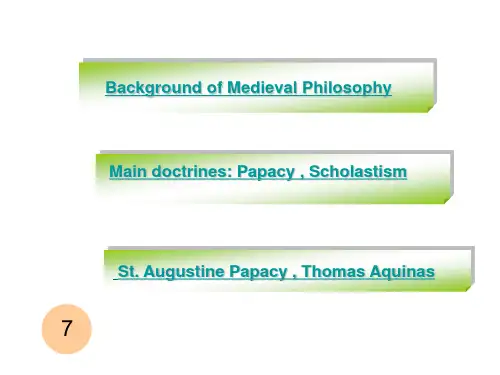
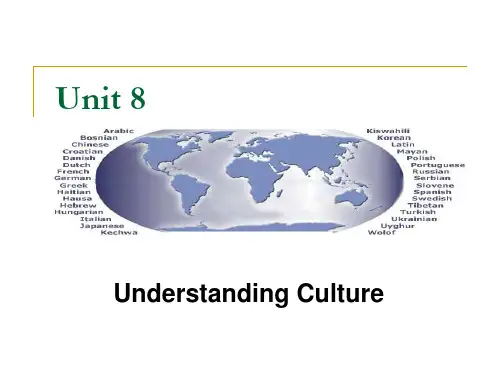
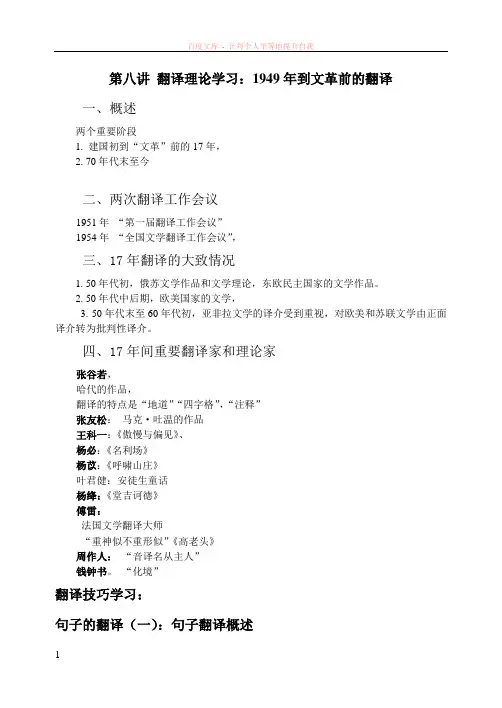
第八讲翻译理论学习:1949年到文革前的翻译一、概述两个重要阶段1. 建国初到“文革”前的17年,2. 70年代末至今二、两次翻译工作会议1951年“第一届翻译工作会议”1954年“全国文学翻译工作会议”,三、17年翻译的大致情况1. 50年代初,俄苏文学作品和文学理论,东欧民主国家的文学作品。
2. 50年代中后期,欧美国家的文学,3. 50年代末至60年代初,亚非拉文学的译介受到重视,对欧美和苏联文学由正面译介转为批判性译介。
四、17年间重要翻译家和理论家张谷若,哈代的作品,翻译的特点是“地道”“四字格”,“注释”张友松:马克·吐温的作品王科一:《傲慢与偏见》、杨必:《名利场》杨苡:《呼啸山庄》叶君健:安徒生童话杨绛:《堂吉诃德》傅雷:法国文学翻译大师“重神似不重形似”《高老头》周作人:“音译名从主人”钱钟书。
“化境”翻译技巧学习:句子的翻译(一):句子翻译概述一、词序调整(1)Even the wild animals of his homeland, it seemed to Kunta, had more dignity than these creatures. (Alex Haley, Roots)昆塔觉得,即使他家乡的野兽也比这群人自尊自重。
(插入语换序)(2)In this way an earlier and perhaps even greater crop might be obtained.用这种方法,庄稼可以早一点收获,收成或许更好些。
(定语换序)(3)From the moment they set foot on the territory of their motherland, they were warmly received by their compatriots.他们从走上祖国土地的时刻起,就受到同胞们热情接待。
(定语从句换序)(4)Cheerful, efficient and warm-hearted, they will do everything to make your journey smooth and comfortable.他们乐观、能干、热情,总是想方设法使你一路上顺利舒适。
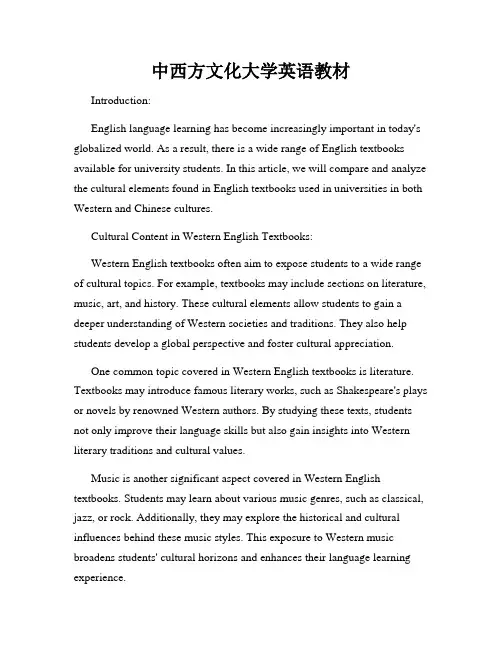
中西方文化大学英语教材Introduction:English language learning has become increasingly important in today's globalized world. As a result, there is a wide range of English textbooks available for university students. In this article, we will compare and analyze the cultural elements found in English textbooks used in universities in both Western and Chinese cultures.Cultural Content in Western English Textbooks:Western English textbooks often aim to expose students to a wide range of cultural topics. For example, textbooks may include sections on literature, music, art, and history. These cultural elements allow students to gain a deeper understanding of Western societies and traditions. They also help students develop a global perspective and foster cultural appreciation.One common topic covered in Western English textbooks is literature. Textbooks may introduce famous literary works, such as Shakespeare's plays or novels by renowned Western authors. By studying these texts, students not only improve their language skills but also gain insights into Western literary traditions and cultural values.Music is another significant aspect covered in Western English textbooks. Students may learn about various music genres, such as classical, jazz, or rock. Additionally, they may explore the historical and cultural influences behind these music styles. This exposure to Western music broadens students' cultural horizons and enhances their language learning experience.Cultural Content in Chinese English Textbooks:In comparison to Western English textbooks, Chinese English textbooks tend to focus more on language acquisition rather than cultural exploration. While there may be some cultural elements incorporated, they are often condensed and integrated into language learning exercises.Chinese English textbooks might introduce Chinese proverbs or idiomatic expressions that reflect specific cultural values. For example, students may learn the proverb "风水轮流转" (fēngshuǐ lúnliú zhuǎn), which means "fortune can change for better or worse." This provides students with a glimpse into Chinese cultural beliefs and mindset.Additionally, Chinese English textbooks may incorporate traditional Chinese festivals and customs. Students might learn about the significance of festivals like Spring Festival (Chinese New Year) or Mid-Autumn Festival, along with associated cultural practices. These topics allow students to understand aspects of Chinese culture while strengthening their language skills.Comparison and Analysis:While Western English textbooks place a heavier emphasis on cultural content, Chinese English textbooks prioritize language acquisition. Both approaches have their merits. Western textbooks expose students to a wide range of cultural topics, facilitating cross-cultural understanding. On the other hand, Chinese textbooks create a more language-focused learning environment.In terms of language fluency and cultural understanding, Western English textbooks may have an advantage. By studying literature and music, students are not only exposed to the language but also the social, historical, and artistic contexts in which it is used. This multi-dimensional approach enhances language fluency and cultural competency simultaneously.However, Chinese English textbooks also play a crucial role by providing students with a solid language foundation. By integrating cultural elements into language exercises, students are exposed to practical language usage while gaining insights into Chinese culture.Conclusion:English textbooks used in universities in both Western and Chinese cultures have unique approaches to incorporating cultural content. Western textbooks focus more on exposing students to various aspects of Western culture, while Chinese textbooks prioritize language acquisition with condensed cultural elements. Both methods contribute to language learning and cultural understanding in their respective contexts. By understanding these differences, educators can select appropriate textbooks to meet the diverse needs of students.。
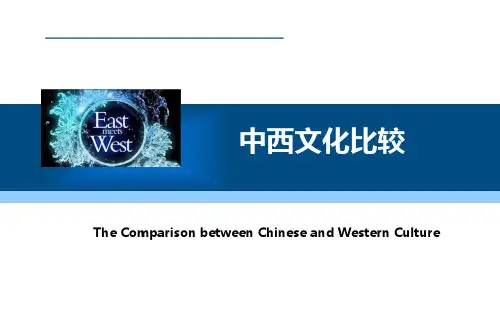
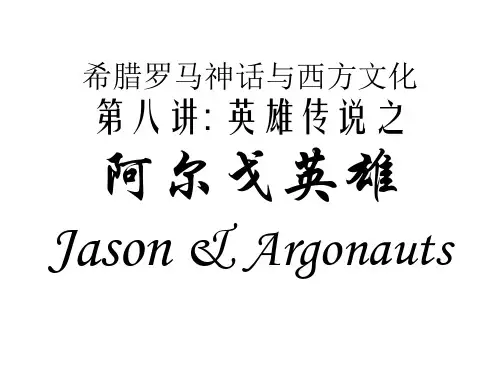

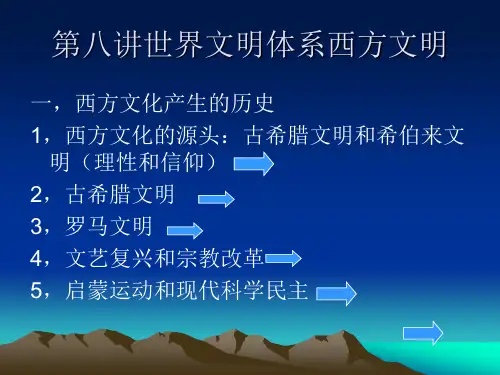
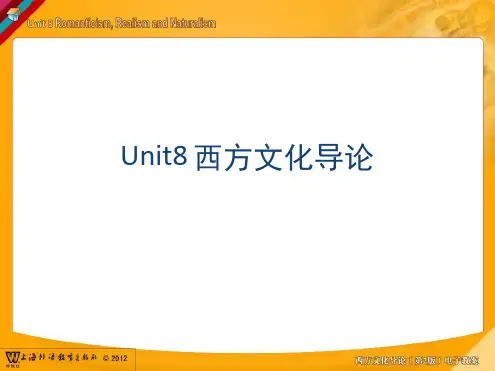
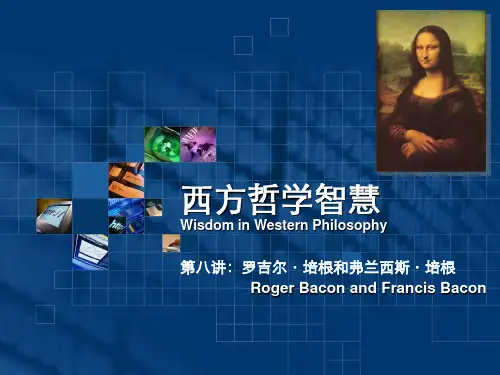
英美文化教程Unit 8Chapter 8 Character and MannersI . Focal Points1.characteristics of the English2.sportsmanship3.manners4.class system in Britain5.politeness in Britain6.English modesty7.the English sense of humourII . Questions and Answers on the Text1. To other Europeans, what is the best known quality of the British, and of the English in particular?To other Europeans, the best known quality of the British, and of the English in particular, is "reserve".2. What is a reserved person supposed to be?A reserved person is one who does not talk .very much to strangers, does not show much emotion, and seldom gets excited.3. Why is it difficult to get to know a reserved person?Because a reserved person never tells you anything about himself, and you may work with him for years without even knowing where he lives, how many children he has, and what his interests are.4. What is the general attitude toward loud speech in Britain?Loud speech is considered ill-bred in Britain.5. What impression does the reluctance of the English to communicate with others give? What is the reality?The reluctance to communicate with others tends to give the impression of coldness, and it is true that the English (except perhaps in the North) are not noted for their generosity and hospitality. On the other hand, they are perfectly human behind their barrier of reserve, and may be quite pleased when a friendly stranger or foreigner succeeds for a time in breaking the barrier down.6. Who are less reserved in Britain?People of the North and West, especially the Welsh, are much less reserved than those of the South and East.7. What is the quality closely related to English reserve?Closely related to English reserve is English modesty.8. What is the general attitude towards self-praise in Britain?Self-praise is felt to be ill-bred in Britain.9. What impression does the English self-deprecation, mixed with their reserve, produce?The English self-deprecation, mixed with their reserve, often produces a sort of general air of indifference which appears to foreigners as a pose, difficult to understand and irritating.10. What is the starting point of the English sense of humour? What is its great enemy?The starting point of the English sense of humour is self-deprecation, and its great enemy is conceit.11. What is the ideal of the English sense of humour?The ideal of the English sense of humour is the ability to laugh at oneself--at one's own faults, one's own failure and embarrassment, even at one's own ideal. 12. What is sportsmanship?Sportsmanship is the ability to practise a sport in obedience to its rules, while also showing generosity to one' s opponent and good temper in defeat.13. How can you prove that sportsmanship as an ideal is applied to life in general?This is proved by the number of sporting terms used in ordinary life.14. Whom does the middle class consist of?The middle class consists chiefly of well-to, do business men and professional people of all kinds.15. Whom does the working class consists of?The working class consists chiefly of manual and unskilled workers.16. What is the most obvious difference between the working class and the middle class according to the author?The most obvious difference between the working class and the middle class is their accent.17. What kind of accent do middle-class people use? What is the characteristic of the accents used by typical Working-class people?Middle-class people use slightly varying kinds of "received pronunciation" which is the kind of English spoken by BBC announcers and taught to overseas pupils, while typical working-class people speak in many different local accents which are generally felt to be uneducated.18. What is one of the biggest barriers of social equality in England as far as education is concerned? Give an example.One of the biggest barriers of social equality in England is the two-class education system. For example, to have been to a so- called "public school" ' immediately marks you out as one of the middle class.19. What is the difference between the life of middle-class people and that of working-class people? Take their meal as an example.The middle classes tend to live a more formal life than working-class people, and are usually more cultured. The midday meal of middle-class people is "lunch" and they have a rather formal evening meal called "dinner", whereas the working man's dinner, if his working hours permit, is at mid-day, and his smaller, late-evening meal is called "supper".20. What is the characteristic of British habits of politeness on the whole?British habits of politeness are on the whole very informal.21. When are handshakes exchanged in Britain?Handshakes are only exchanged on a first introduction, or on special occasions, or as a token of agreement or congratulation.22. What rule is all British politeness based on?All politeness is based on the elementary rule of showing consideration for others, and fitly acknowledging the consideration they show to you.23. When is "Excuse me" used?"Excuse me" is used as an advance apology for troubling some-body, as when passing in front of him or interrupting his conversation, or when putting a question to a stranger.24. What are the functions of "Sorry"?"Sorry" expresses regret for an accidental disturbance or breach of manners. It also takes the place of "no" when you cannot accede to a request or an implied request like "May I borrow your pen?"25. What is the function of "Pardon?"?"Pardon?" is the polite way of asking somebody to repeat what he has said. 26. When are "Yes, please" and "No, thank you" used?"Yes, please" and "No, thank you" are used when somebody replies to an offer.27. How should one express a polite request? What should one say when the request is granted?A polite request does not begin with "I want" or “I think", but with a phrase like "Will (or Would, Can, Could) you please …?" or "Would you mind ... ?" When the request is granted, one should say "Thank you."28. How do British people ask for service that involve real inconvenience?British people do not readily ask each other to do anything that would involve real inconvenience~ If they do ask, the request is accompanied by an implied apology like, "I don't really like ..." or " I asking you, but . or know the trouble I'm causing you, but would you mind ... ?" and so on.29. If you are invited to a person's home in Britain, what time should you arrive?If it is a social occasion, not a business one, it is not polite to arrive early. Ten minutes late is excellent.30. If you are invited to an evening meal in a British home, what time will you probably take your leave?If you are invited to an evening meal in a British home, you will probably take your leave between ten and eleven o' clock..31. What is the main thing about table manners in Britain?The main thing about table manners in Britain is to sit up straight, copy everyone else, gaily asking what to do if you are not sure, and keep the conversation going.32. To whom are tips given in Britain? What is the usual amount of tips given?In Britain, tips are usually given to waiters and taxi-drivers, to whom you give an extra tenth or eighth of the price of the meal or fare. Hotel servants and railway porters, too, expect a small tip if they are of service to you.33. Why should gifts of money be given only cautiously in Britain?Gifts of money should be given only cautiously in Britain because the offer of money makes an act of kindness seem like a mean desire for gain.34. Why is politeness towards women less observed today than it used to be?Because women are now the equals of men in having the vote, taking paid employment and receiving higher education, they receive much less consideration than formerly, for the whole basis of politeness towards women is the feeling that they need protection.35. Give some examples of politeness towards women in Britain.It is considered polite to give up one's seat to a woman who is standing, to open doors for her, help her alight from the bus, carry things for her, protect her from the traffic, and so on, and the maxim "Ladies first" is well known.36. Why are old people respected in Britain?If old people are respected in Britain, it is because they are felt to be in need of protection and support.III. Explanations1. English reserve(1) English reserve is the best known quality of the British, and in particular of the English, to other Europeans. (2) The English are on the whole reserved: they do not talk very much to strangers, do not show much emotion, and seldom get excited. (3) This reluctance to communicate with others is an unfortunate quality in some ways, since it tends to give the impression of coldness.2. English modesty(1) English modesty is a quality closely related to English reserve. (2) Within their heart, the English are perhaps no less conceited than anybody else, but in their relations with others they value at least a show of modesty. (3) Self-praise is felt tobe ill-bred, and the English are typical of self-deprecation.3. English sense of humour(1) English Sense of humour is a quality that is similar to English modesty. Its starting point is self-deprecation, and its great enemy is conceit. (2) Its ideal is to laught at oneself--at one's own faults, one's own failures and embarrassments, even at one's own ideals. (3) It is an attitude to life rather than the mere ability to laugh at jokes. This attitude is never cruel or disrespectful or malicious.4. English sportsmanship(1) Sportsmanship is an English ideal that is highly valued in Britain. (2) Sportsmanship is the ability to practise a sport in obedience to its rules, while also showing generosity to one's opponent and good temper in defeat. (3) Sportsmanship as an ideal is applied to life in general. This is proved by the number of sporting terms used in ordinary speech.5. English class system(1) As a social convention, the English class system is much less rigid than it was, but it still exists below the surface. (2) Broadly speaking, it means there are two classes, the "middle class" and the "working class". The middle class consists chiefly of well-to-do business men and professional people of all kinds; the working class consists chiefly of manual and unskilled workers. (3) The most obvious difference between them is in their accent. The middle classes also tend to live a more formal life than working-class people, and are usually more cultured.。
Unit1根据传说,伏羲生于中国西部,出生之前在其母腹中孕育了12年。
伏羲教会了人类打猎、捕鱼、驯养野兽、饲养家禽。
伏羲制定了人类的嫁娶制度,教会人们劈柴取火和烹煮食物;他还通过龟背上的裂纹创立了八卦,这些八卦成为数学、医学、占卜学和风水的基础。
此外,伏羲还创造了中华民族的图腾龙,被认为是中国历史上第一个真正的统治者。
Fuxi was born in the west part of China and, according to legend, he was carried in his mother’s womb for twelve years before birth. He taught people how to hunt, fish, domesticate animals and tend their flocks. He instituted marriage and taught people how to devise tools to split wood, kindle fire and cook food. He devised the Trigrams, which evolved from markings on tortoise shells. These trigrams served as the basis for mathematics, medicine, divination and geomancy. Furthermore, he created the Chinese dragon as the totem of the nation and was considered as the first real ruler.Unit2儒家的创始人是孔子(公元前551—479),他提出了一套道德规范,基于五种美德:仁、义、礼、智、信。
其中“仁”被认为是他的哲学理念的基石,代表着忠诚、孝道(filial piety)、宽容和善良。